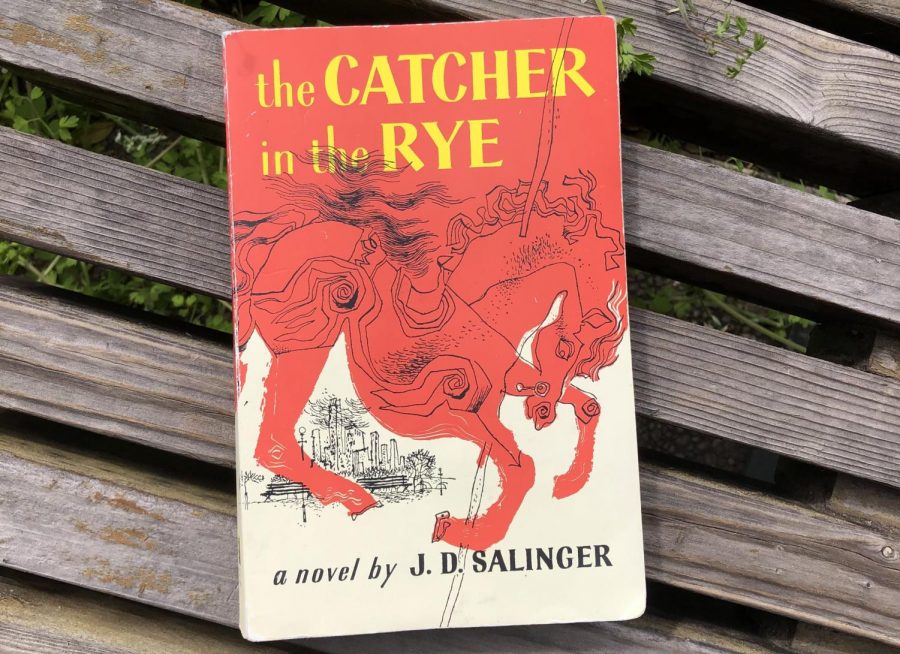Where did Holden Caulfield Go?: How the English curriculum at Castilleja is diversifying
“The Catcher in the Rye” is a trademark novel in a Castilleja student’s English career, but it was recently removed from the 9th-grade curriculum
Many of us have that one specific book from English class that struck a nerve of intrigue or happened to say the right thing at the right time. For me, that book was “The Catcher in the Rye” in 9th grade. While the book itself is controversial at best, Holden’s words were a comfort in a time of uncertainty and bitterness (May 2020, beginning of the pandemic). By the end of the novel, I began to recognize Holden as more of a work in progress; he’s a flawed and complex character designed to be observed rather than admired.
The 9th grade English curriculum for the 2020-2021 school year underwent a multitude of changes, including removing “The Catcher in the Rye,” “Othello,” and parts of “The Odyssey.” Christina Gwin and Valerie Ross, our two 9th grade teachers, explained this procedure, noting that “when teachers have an idea for a change, we consult the whole English department so that considerations of how each grade level will build upon the previous or prepare for the next [can be taken into account].” Choosing books for the year isn’t a clean process—it consists of a series of discussions within the department.
Considering recent events like the Black Lives Matter movement that completely shook the country, rightfully demanding change, it was clear to the English department that their previous curriculum had to be rethought in order to include more voices. Ms. Gwin and Dr. Ross described that such changes were made because there was “a clear sense that the 9th-grade curriculum needed much more representation of literature by people of color and women, and out of our commitment to antiracist principles.” New additions include the award-winning novel, “Long Way Down,” by African American author Jason Reynolds and the Chinese-American classic, “The Joy Luck Club,” by Amy Tan.
However, the replacements aren’t out of dislike for “classic” literature, like Shakespeare’s “Othello” or even Salinger’s “The Catcher in the Rye,” but rather, a way to make room for voices that have not yet been properly amplified. The question of what even constitutes a novel as a “classic” is a relevant one as well, considering who historically has had the loudest voice. In an interview with Dr. Ross and Ms. Gwin, they exclaimed that, while they still find “the classics” relevant, “we want to expand those definitions [of classic literature] to open up possibilities for more diverse representation of people of color and women’s voices.”
When asked what “the classics” meant to her, Jenny Raterman, another member of the English department, explained that the answer’s not that simple. “There is no consensus of any kind about a definition of ‘classic literature,’ but for me, it’s not a very useful term,” she clarified. “A good teaching text should engage students in stories and ideas that will help them find their place in the world as thinkers and writers.” She explained that often “texts have pedagogical value because they give students what we call ‘windows’ into experiences different from their own, or because they offer students ‘mirrors’ in which they can see themselves represented.” In terms of windows and mirrors, Dr. Raterman further expressed, “I try not to make assumptions about which ways texts work for my students since we all bring such diverse lives to our reading.”
Claire Wong ‘24, a current freshman, shared how she’s really enjoying the changes, specifically the implementation of “The Joy Luck Club” in her course curriculum. “Being Asian American myself, I’m also happy that I get to read a book with people who look like me and share aspects of my culture,” Claire explained. “’The Joy Luck Club’ has allowed me to draw parallels between the experiences of the characters to family members and people I know, and I now have a deeper respect for them because of reading this book.” Echoing her enthusiasm, Loralei Rohrbach ‘24 described her admiration for “Long Way Down”: “I thought that was really phenomenal, and we had some really meaningful discussions.” Satisfied with the changes, both Loralei and Claire are excited for future students to read and experience them as well.
Reflecting on “The Catcher in the Rye,” current seniors Dani Levy ‘21 and Helen Horangic ‘21 discussed their positive yet exchangeable experiences. “[‘Catcher’] was important for our development in English class, but we think that the qualities that helped us learn these skills could probably be found in other novels as well,” they explained. “Some of the qualities that we specifically appreciated were the heavy use of symbolism and having a protagonist with mental health issues because that was important for erasing stigma in our class.” Although they both had positive experiences, they don’t find the novel especially unique. Dani and Helen clarified that “if anything, we think that a novel with a more relevant and relatable character whose mental illness is even better represented would be preferred.”
While the optimal outcome would obviously be to cover it all, yearly classroom time provides clear limitations. It may be difficult to see the texts we enjoy be removed, but in the end, there are no hard feelings towards said novels, simply a drive to empower more voices.
Looking back at my own positive encounter with “The Catcher in the Rye,” I realize that I attribute much of that success to my class and community. I owe it to my teacher, Ms. Hansen, because of her constant support, and to my peers, who continuously created and engaged in meaningful discussions. The way we immerse ourselves with the novels in the classroom broadens our own perceptions and results in significant, lasting reading experiences. Our in-class discussions make all the difference, which is why it’s important to engage and focus on diverse stories and voices since, as Ms. Gwin said, “what you devote your time to shows what you prioritize.”

When she’s not making irrelevant playlists on Spotify, Jesse Gross ‘23 is probably forcing her dog to hang out with her. But most likely, she's simply...

Parisa Braun '23 is the Co-Editor-in-Chief of Counterpoint, and this is her fourth year of being a part of the Counterpoint team! When she isn't trying...


